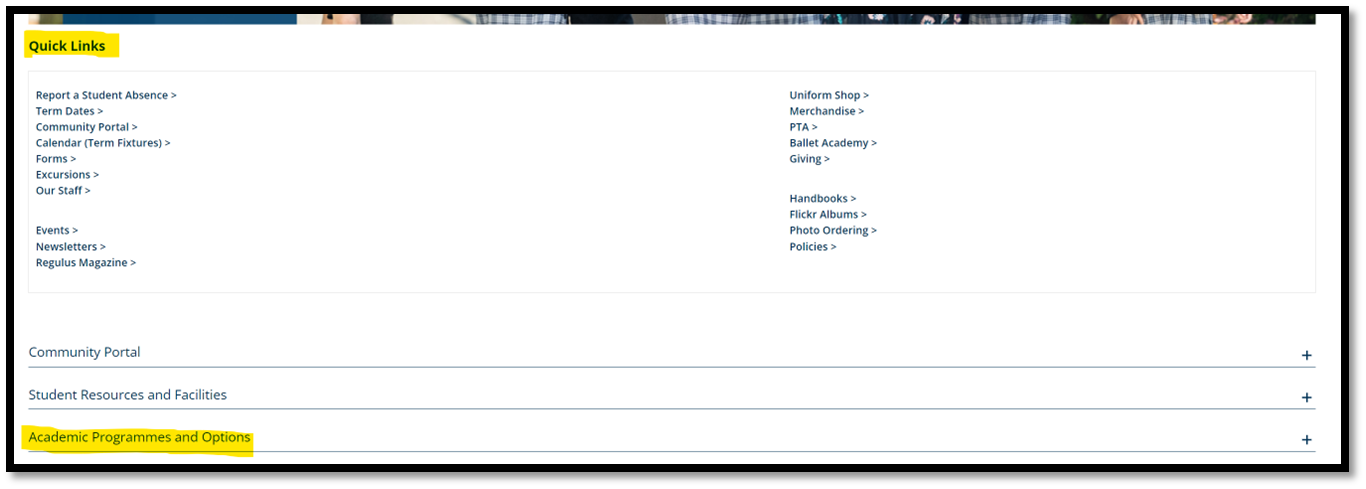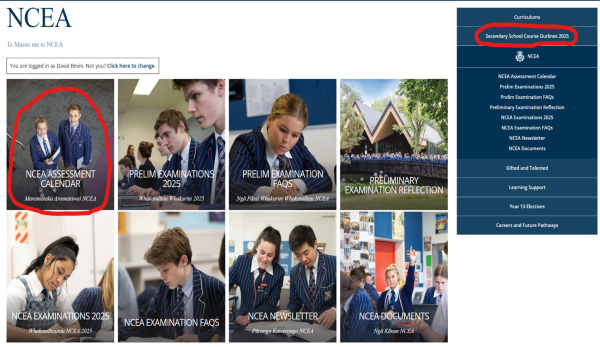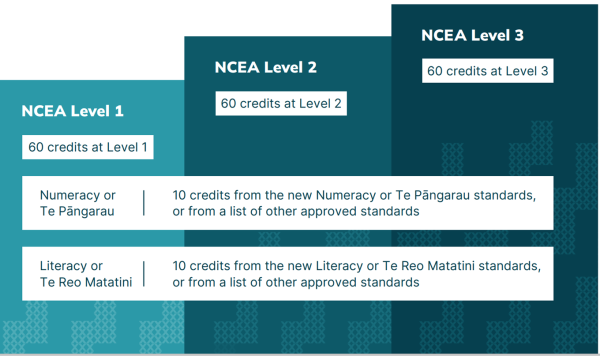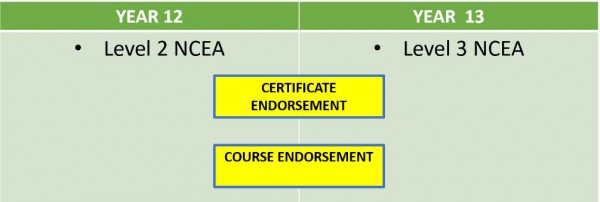
You are logged in as
Logout
You are logged in as
Logout
Dear Parents and Caregivers
It’s nearly the end of Week 5 of Term 1 and the pace of learning and assessment is heating up. In this newsletter, I outline several NCEA details and things to look for, or be aware of, as your child makes their way this year through Level 2 or 3 NCEA. I also make a request of parents regarding our Prelim examinations in September.
So, as to keep this newsletter a little bit shorter, in my next one, I’ll explain the workings of Course Endorsement and University Entrance and will talk about why the Level 2 results are surprisingly very important for the future.
At all times, please feel free to contact me via email with any questions that you may have about NCEA at DBV@stac.school.nz.
Kind regards
David Bevin
Head of Teaching and Learning – Secondary

Rather than trying to retain their knowledge of lots of facts about the workings of NCEA, it is particularly important for parents to understand some of the issues that students in their second or third year of NCEA will need to manage.
While students need to be increasingly independent in managing their NCEA commitments, parents are encouraged to continue to have an input into what their child is doing academically, be it in Year 12 or in Year 13, by asking them about their courses and what is involved, asking about their academic schedules i.e., assessment dates and by checking in on their academic achievement i.e., assessment results.
The year goes by at a rapid pace and, as an example, by the time you read this newsletter, students will have nearly completed Week 5 of this 10-week first term! It is important to say that students should be well under way with their work this year, be organised, be clear about what assessments they have in each course and by when each should be completed.
Here's a form of the 'road map' for your child and you this year.
A PICTURE OF THE 2025 ACADEMIC YEAR – WHAT TO BE AWARE OF
|
TERM |
LENGTH (WEEKS) |
WHAT’S HAPPENING |
BE AWARE OF |
CHECK FOR |
|
1 |
10 Ends 4 April |
|
|
|
|
2 |
9 Ends 27 June |
|
|
|
|
3 |
10 Ends 19 September |
|
|
|
|
4 |
2 (+ 3 days) |
|
|
|

Select StACNet at the top, and then to:

 You will be able to access the ‘Course Outlines 2025’ folder as shown in the screen shot. All course outlines are presented in very similar formats so that you can easily find your way around them and will be able to read through the subject’s assessment information. This will help you and your child to gain a good view of the subject’s assessment programme for the year and so manage the planning. Then, to access the NCEA information, it’s all right there alongside the Course Outlines Button. Throughout this year, the various folders will be updated as needed and you will regularly be referred to one or more of them in my newsletters or in emails that you will receive.
You will be able to access the ‘Course Outlines 2025’ folder as shown in the screen shot. All course outlines are presented in very similar formats so that you can easily find your way around them and will be able to read through the subject’s assessment information. This will help you and your child to gain a good view of the subject’s assessment programme for the year and so manage the planning. Then, to access the NCEA information, it’s all right there alongside the Course Outlines Button. Throughout this year, the various folders will be updated as needed and you will regularly be referred to one or more of them in my newsletters or in emails that you will receive.
Internal assessment is obviously the big concern for students this year. Most students will be assessed in, on average, 15–20 internals across the year (depending on whether they are taking five subjects (Year 13) or six subjects (Year 12)). A few students will gain their NCEA through internal assessment before they even sit the external examinations in November and, as such, internal assessment is ‘high stakes’.
We have clear rules and procedures for students to follow covering many matters including student absence from an internal, late submission and breaches of authenticity and these are all detailed in the student copy of the ‘Rules and Procedures’. All students are receiving their own copy of the ‘R & P’ in their tutor time; they must be sure to read them as the rules must be, and are, applied in all assessments.
In my next newsletter, I’ll more fully explore the rules that we apply to the management of internal assessments, however, issues around extensions and absence from assessments occur every year and have begun to occur already so it is important for you to know that we have clear processes and rules for managing those issues so that assessment is fair to all students. Students simply cannot just hand in an assessment late or not turn up to a test without having a valid, and approved, reason. They must follow our procedures in this area.
This week, a post has been placed in each year level’s Teams page providing the link to the online form for applying for an extension in an NCEA assessment. This form is also used if a student needs to complete an assessment early i.e. before a deadline or is unable to sit an in-class test for a valid reason. Our process is very simple, and I can already confidently say that the process works well and very efficiently. The key to its success is communication, specifically, that students talk to their teachers if they have problems with an assessment date.
Note about Medical Certificates: For medical conditions, students must provide a medical certificate as part of their application as shown here; if they do not, they will not have an extension. This is non-negotiable on the school’s part.

This very important calendar provides overview information about what assessments are on when, according to each year level. Please note that assessment programmes are of necessity a little ‘fluid’ and therefore dates sometimes change; teachers are expected to keep students and parents informed of such changes so please understand that what is on the Calendar, while it’s accurate, is not ‘set in stone’. The Calendar provides an important way of helping your student to programme their commitments term-by-term and is updated for the start of each subsequent term, ready for the return to school after each holiday.
On the NZQA website you can access the timetable for this year’s end-of-year national examinations – click here. While it’s very early days to look at this, if students and their parents are looking at holidays at the end of the year, it is essential to look at the student’s examinations timetable. Note that these are national assessments so are fixed and cannot be changed.
The timetable also shows completion dates for assessments in subjects that do not have examinations but do have external assessments at some stage late in the year such as in Digital Technology, DVC, Materials Technology and Visual Arts. Deadlines are provided and are just that – deadlines - and students who are entered for these externals must meet those key points to be assessed – no date change is possible for any student as it is just like an external examination.
It’s also important to check the timetable to see if a student has an examination clash, meaning they might have more than one examination on at the one time. While this doesn’t happen a lot, it does happen, and special arrangements are made by NZQA in this situation to enable the student to sit both of their clashing examinations on the same day.
The College Prelim examinations will run in Weeks 8 and 9 of Term 3. The Prelims are one of the ‘high points’ of our academic year and provide a proper, ‘dry run’ for the later NCEA examinations. Students are assessed in most, or all, of their external standards in these examinations and important feedback is given to them on the progress in their subject knowledge and understanding to that point.
Many parents will be familiar with the derived grade that is available for NCEA in cases of absence from examinations or impairment.
Because of the great importance of the Prelim examinations for feedback, College academic awards and as providing ‘replacement’/derived grades for cases of absence from, or impairment in, the November NCEA examinations, it is essential that students attend their Prelim examinations.
In 2024, there was a small number of students who were unable to sit some or all of their Prelim examinations because travel arrangements had been made earlier in the year that clashed with the Prelims. In such a situation, the College will not allow a student to sit their scheduled Prelim examination/s at another time and they will not have the opportunity to gain derived grades. Last year, a number of students needed to apply for derived grades for NCEA but were unable to provide any from the Prelims as they had not sat them. Please treat the Prelim examinations as essential events in the College’s academic calendar this year.
We have many students sitting NCEA examinations online this year, just as in previous years and, of course, much internal assessment requires students to complete work on their device. Parents are asked to ensure that their child understands the importance of device readiness i.e. that their laptop is in good working order for use throughout the year and, especially, for completing NCEA examinations. Students know now what examinations they will sit online and so they must take responsibility for ensuring that their device will work well in their examinations and, in particular, that the device will be charged well enough to enable them to complete each 3-hour examination. We are making one change to our policy this year in this area in that the College will not provide a backup laptop for use in NCEA examinations unless it is a last-minute situation for the student.

It’s very relevant at this point to remind you of the ‘one-stop shop’ nature of our Community Portal, which sits within StACNet. Parents are able to access a lot of information provided by the College with regard to attendance, assessment and reporting.
When you click on the Results tab on the right of the screen, you will be able to access both the Fortnightly Feedback and the ‘powerful’ and dynamic NCEA Current Results Summary. This particular document enables you to see the grades that your child gains over the course of the year in their various internal assessments and practice/indicative assessments and their progress towards NCEA awards, such as certificate and course/subject endorsement. You no longer have to ask your child to tell you what their assessment results were because you can see them through your own login!
When you click on ‘NCEA Current Results Summary for (your student’s name)’, you will be able to see the subject, standards, credit values and, when results are recorded by teachers, grades gained for those standards.
At this early stage of the year, it’s a good idea to have a look through this information so that you can see just what assessments they are likely to be doing. Early on, very few results will show but as the year progresses and internals are completed, it will become very interesting reading that you will not need to ask your teenager to show you – there’ll be no ‘hiding’ from results! The summary table ‘NCEA Results Summary’ provides an excellent summary of ‘Achievement/Merit/Excellence credits’ that are being gained and so shows their progress towards a Merit or an Excellence endorsement.
You will of course be very familiar with these ‘snapshot’ views of your child’s attitude and effort in class as we give you feedback on these most fortnights through the year. In terms of a student’s academic progress and achievement, the Feedback is very important because there is a very clear connection between a student’s attitude to learning and their effort in class and their overall academic achievement. So far, teachers have provided one feedback; we report in this way, but we don’t notify you that they are there. Remember that this term for example, feedback is provided in Weeks 4, 6, 8 and 10.

An extra thing to note from the above model:
Because Senior College parents have at least one, if not two, years’ experience with NCEA it is not my intention to reiterate all of the ‘workings’ of NCEA. This very simplified diagram provides a good summary of the key targets in terms of NCEA awards such as endorsement and certificate gains that are common to both NCEA levels. This very simplified diagram provides a good summary of the key targets in terms of NCEA awards such as endorsement and certificate gains that are common to both NCEA levels.
As well ... If a student in Year 12 studied Level 2 subjects while in Year 11, their level 2 credits gained are added to this year’s total. Equally, if a student in Year 13 studied Level 3 subjects while in Year 12, their level 3 credits gained are added to this year’s total.


For a Year 12 student, any Level 2 Merit or Excellence grades gained last year are carried over to this year’s total for the purposes of certificate endorsement.
For a Year 13 student, any Level 3 Merit or Excellence grades gained last year are carried over to this year’s total for the purposes of certificate endorsement.